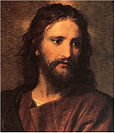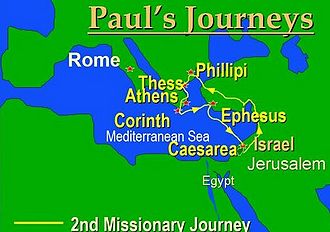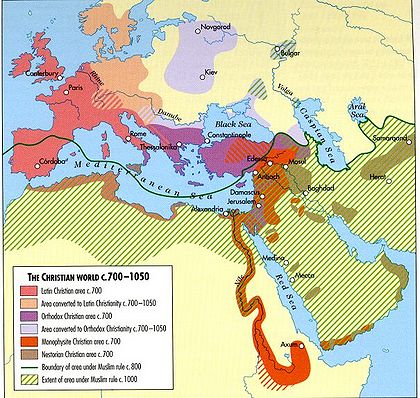Missions
 From Conservapedia
From Conservapedia Missions are efforts to spread religion, as well as organizations whose main purpose is doing so.
Contents
Christian Missions[edit]
Jesus Christ ordered his disciples go forth and teach all nations (Matt. 28:19); Christian missions are the response to this command. The history of missions is, to a large extent, the history of the spread and growth Christianity from its origins in the Holy Land, to the Roman Empire, Europe and beyond.
Roman Empire[edit]
The Acts of the Apostles, written by Saint Paul, is the chronicle of the first Christian missions.
Thanks to Paul and other aposltes, the church spread until by 100 AD it reached most of the great Mediterranean cities; the rural areas remained pagan. By 300 AD Christianity was a dominant force in the Greek-speaking reals on the eastern half of the Roman Empire. In 313 AD it was proclaimed an official religion of the Roman Empire. By 400 AD it had extended as far as India in the east and Ireland in the west. The following centuries saw the expansion of the church into northern Europe, and the evangelization of Germany and Scandinavia continued through the early medieval period.
Barbarian invasions[edit]
Wave after wave of Barbarian invasions hiot the western half of the Roman Empire after 400 AD. Each in turn was converted to Christianity.
Europe[edit]
England[edit]
Saint Augustine of (died 604), was "the Apostle of England" and was the first archbishop of Canterbury. he was an Italian monk sent along with 30 other monks in 596 to convert the Anglo-Saxons. King Aethelbert, who had married a Christian, allowed them to preach, and to establish a church. Augustine freely adapted local pagan customs to Christianity. His policy was to preserve pagan temples and to destroy only the idols, transforming pagan rites and customs into Christian practices whenever possible.[1]
Ireland[edit]
Saint Patrick (389-461 AD)was born in Roman Britain and, at the age of 16, was captured and sold into slavery in Ireland. He escaped and decided to convert the Irish to Christianity. He studied and was ordained in Gaul (France), was ordained a bishop (432) and set out for Ireland.
Although opposed by pagan priests of the indigenous religion, Patrick secured toleration for Christians and, through active preaching, made important converts among the royal families. He developed a native clergy, fostered the growth of monasticism, established dioceses, and held church councils.[2]
Other religions[edit]
Judaism[edit]
Judaism sponsored missionary work in the early Roman empire. Jews came to think of their God not merely as a national deity but as the ruler of all humankind. Though Israel was his chosen people, God had a plan to benefit all people through them. Israel was to be the "suffering servant," whose sorrows would be a blessing to all humanity. The destruction of Jersualem by Titus in 70 AD dealt a major blow. Missionary activity largely ended after Emperor Hadrian crushed the Jewish rebellion in 131 AD and dispersed the Jewish residents of Palestine.
See also[edit]
Further reading[edit]
- Anderson Gerald H. Biographical Dictionary of Christian Missions (1999), 854pp; comprehensive coverage of 2400 missionaries excerpt and text search
- Kenneth Scott Latourette, A History of the Expansion of Christianity (7 vol 1937-45), the great narrative history
- Neill, Stephen,and Owen Chadwick. History of Christian Missions (2nd ed. 1991) excerpt and text search
- Robert, Dana. Christian Mission: How Christianity Became a World Religion (2009) brif summary excerpt and text search
- Shenk, Wilbert R., ed. North American Foreign Missions, 1810-1914: Theology, Theory, and Policy (2004) 349pp important essays by scholars excerpt and text search
References[edit]
- ↑ Margaret Deanesely, Augustine of Canterbury (1964)
- ↑ E. A. Thompson, Who was Saint Patrick? (1999) excerpt and text search
Categories: [Christianity] [Christian History] [Religion] [Missionaries]
↧ Download as ZWI file | Last modified: 03/06/2023 03:41:57 | 133 views
☰ Source: https://www.conservapedia.com/Missions | License: CC BY-SA 3.0
 ZWI signed:
ZWI signed:


 KSF
KSF